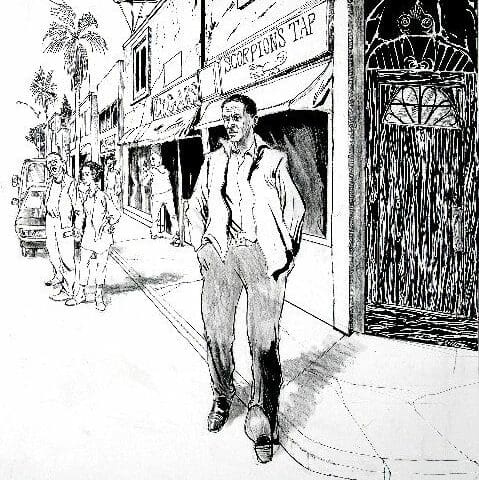
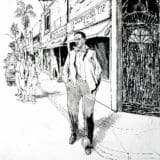
“You don’t know what the hell you sayin’,” the red-eyed man blurted. He came off his barstool too fast, knocking it over as he did so. Drunk, he teetered over to Hank Dixon, who’d turned on his stool toward him but remained sitting.
“Best slow your roll, Al,” the one-handed bartender Pierre Gaston said languidly. He took hold of an empty glass between the pincers of his prosthesis. Behind him and above the bottles on a flat screen TV, played a near mute newscast about a truckers’ job action at the port.
“Oh, I’m’a slow somethin’,” Al Griffiths sneered, ignoring the advice. He stood close to the stockier Dixon; Griffiths’ beer and vodka chasers a heavy aroma in the other man’s nose. “You didn’t go around with Juanita. She wouldn’t have had anything to do with you, toilet seat fixer.”
Dixon squinted at his accuser as he sipped on his beer.
» Read more about: The Dixon Family Chronicles: “The Sink Man” »
» Read more about: Watch: Gary Phillips Discusses “The Dixon Family Chronicles” »
By now British films that combine gritty economic issues with musical set pieces have become their own genre. These movies, often based on historical fact, typically involve the seemingly crazy schemes of a plucky band of commoners to save a dying industry or rescue a besieged group of workers. Pride is the most recent descendent of Brassed Off, The Full Monty, Kinky Boots and Made in Dagenham. It’s the story of the fateful 1984-85 coal miners’ strike, during which Prime Minister Margaret Thatcher managed to cripple the National Union of Mineworkers.
Stephen Beresford’s screenplay follows the efforts of Mark Ashton (Ben Schnetzer), a young gay militant, to rally his LGBT comrades to collect funds for the increasingly harried miners. He finds only a few adherents, but this energized band, which includes a closeted young student named Joe (George MacKay), a sarcastic lesbian, Steph (Faye Marsay) and a flamboyant actor played by Dominic West,


Seleta Reynolds, Los Angeles’ new chief of transportation, wants to help break L.A.’s dependence on cars. She believes that bikes are key to doing it. New York City, the Bay Area and other metropolises have already begun to show that a mixed transportation network with a central role for bicycles can be achieved in America. But can bikes prosper in the most infamous car town in the world?
Before being hired by Mayor Eric Garcetti this summer, Reynolds helped lead San Francisco’s Livable Streets office in that city’s transportation agency. She sees a bit of L.A.’s future in San Francisco’s present.
“In San Francisco, people are truly multimodal,” she told Capital & Main. “They take taxis, they take Uber and Lyft. They ride their bikes, they take a bike-share. They take the ferry, they ride the bus, they take the Muni Metro. Sometimes they drive, they take car-shares.
» Read more about: A Bike Lane Runs Through It: L.A. Rethinks Transportation »
It sounded like a moment from a Chris Rock comedy: A bewildered black motorist writhes on the ground in pain, asking, “What did I do, sir?” of the white police officer who has just shot him at a gas station in broad daylight.
“I just got my license – you said, ‘Get your license’!” exclaims the wounded Levar Jones, who only seconds before had his arms raised in the air. “Why did you shoot me?” The South Carolina Highway Patrol officer matter of factly replies, “For a seatbelt violation.”
The incident, of course, was no comedy or part of a Hollywood movie, but was recorded in the city of Columbia by the officer’s dashboard camera. It took place September 4, although the video only surfaced yesterday. It shows the officer firing four shots at the driver who had been standing beside his pickup truck, when he turned to his vehicle to retrieve his license.
» Read more about: Video Captures Another African American Shot By Police »
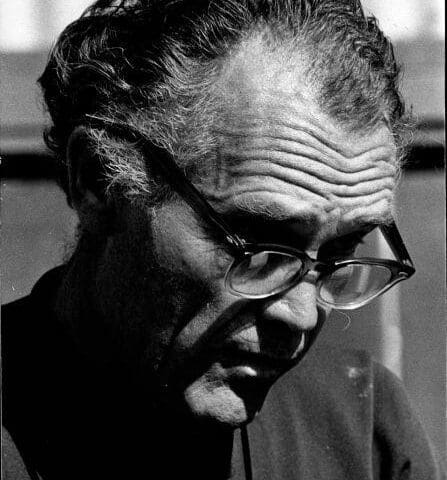
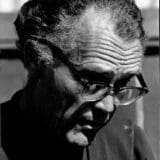
The police stop a young man. An officer shoots, killing him. The officer claims self-defense, that the killing was warranted.
The community, having endured years of unequal treatment at the hands of law enforcement and other municipal agencies, responds in anger. Protests ensue. Hard feelings persist, as do demands for law-enforcement accountability.
Sound familiar? No, this is not the case of 18-year-old Michael Brown in Ferguson, Missouri. The young man in question was Augustin Salcido, 17, and the incident occurred in Los Angeles more than six decades earlier. The Internet did not exist at that time and local television audiences were miniscule, so the Civil Rights Congress of Los Angeles produced a pamphlet, Justice for Salcido. In its introduction, author and civil rights advocate Carey McWilliams described the killing as part of a historical pattern of “continued suppression of the Mexican minority.”
Fred Ross,
» Read more about: Fred Ross, Cesar Chavez and Lessons for Ferguson »


For Americans today – particularly for bloggers, Senators, reporters and activists — it’s pretty much always a definitive rebuke to accuse someone of “acting politically.” Reflexive disdain for political motives is deeply rooted in our popular culture, which so often assumes that ethics is one thing, politics quite another. “You quit a profession you love for ethical reasons,” the President tells the main character on CBS’s Madam Secretary. “That makes you the least political person I know.”
But however culturally pervasive and recognizable this kind of disparagement may be – however tempting it is to call out someone for their political motives — there are reasons to do so sparingly.
To see why, it’s worth reflecting on two of the most striking recent instances in which base political motives have been alleged. Both the right and left agreed that Barack Obama’s decision to postpone executive action to reduce deportation of undocumented immigrants was unprincipled and political.
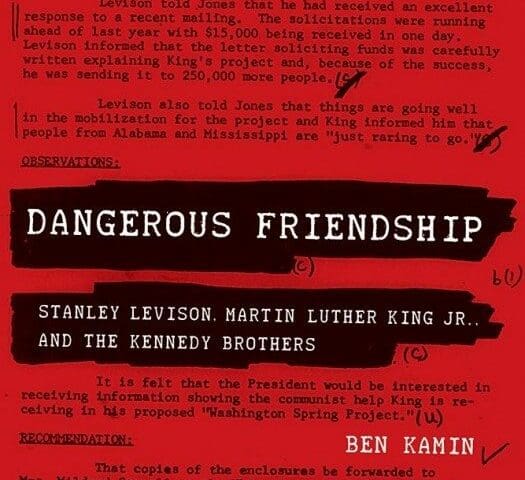
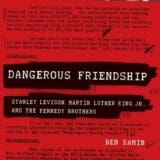
FBI Director J. Edgar Hoover tried to erase the name of Stanley Levison from civil rights history in the 1960s. Now historian Ben Kamin is putting Levison firmly back into the historic record with his new book, Dangerous Friendship: Stanley Levison, Martin Luther King, Jr., and the Kennedy Brothers.
Levison was a successful Jewish businessman and member of the American Communist Party until 1956, when the Soviet invasion of Hungary left him disillusioned. He refocused his organizing skills, business and labor contacts, energy and intelligence to support the work of Martin Luther King Jr., helping to found, manage and fund King’s organization, the Southern Christian Leadership Conference. In the process, Levison became an intimate friend of King and part of the tight circle of confidants who helped develop King’s campaigns and sustain him emotionally.
What drew Levison, and hundreds of other American Jews like me,
» Read more about: Book Review: MLK’s Dangerous Friendship »
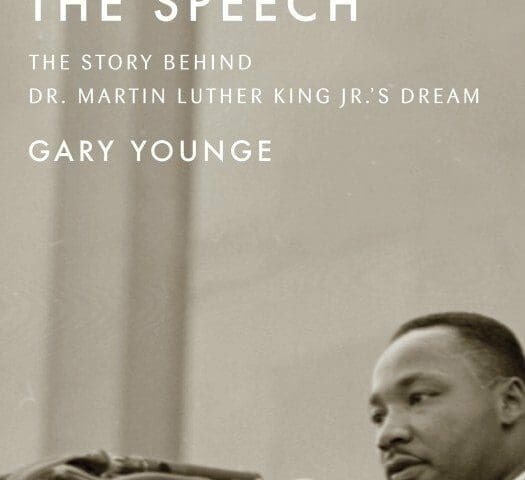

August 28th marked the 51st anniversary of the historic March on Washington for Jobs and Freedom. On that sweltering day in 1963, amidst an atmosphere of racial tension stoked by political indecisiveness, as well as acts of violent Southern resistance defined by bombings and bloody protests, 250,000 Americans converged on the National Mall. There, facing the Lincoln Memorial, educators, clergymen, entertainers, civil rights leaders, politicians and ordinary citizens listened to a day of speeches, prayers and song. They had gathered so that their voices could be heard throughout the nation, but one voice on that day would be heard above all others.
Dr. Martin Luther King Jr. was the last speaker when he delivered his “I Have a Dream” speech. That historic oration is the subject of The Speech: The Story Behind Dr. Martin Luther King Jr.’s Dream, by Chicago-based journalist Gary Younge. Its four chapters brim with key insights and revelations about those troubled times,
» Read more about: Gary Younge on MLK’s Most Famous Speech »
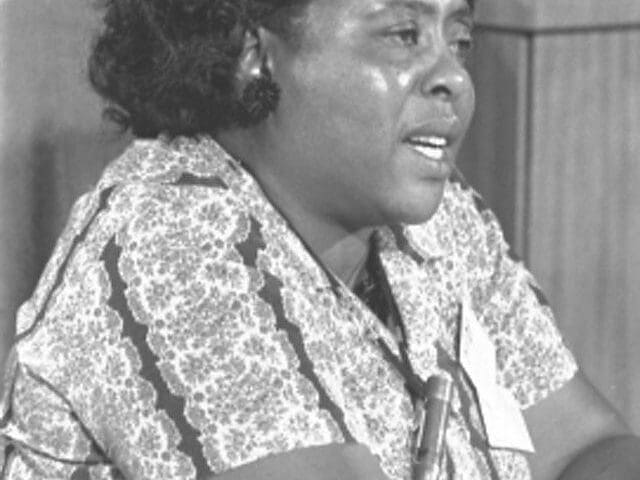
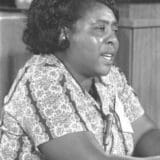
“I question America ” — the famous words spoken by civil rights activist Fannie Lou Hamer 50 years ago this week at the tumultuous Democratic Party convention in Atlantic City — is a fitting reflection of the soul-searching that the country is once again going through in the wake of the turmoil in Ferguson, Missouri.
To understand both the progress America has made, and the many challenges it now faces, in terms of racial justice, it is useful to remind ourselves of the battle that occurred a half century ago and the life of Ms. Hamer, a sharecropper and activist from the Mississippi Delta who galvanized the country with her stirring words and her remarkable courage.
In her testimony before the credentials committee at the Democratic Party’s convention in Atlantic City, New Jersey, Hamer explained why the committee should recognize the integrated Mississippi Freedom Democratic Party over the state’s segregated official party delegation.
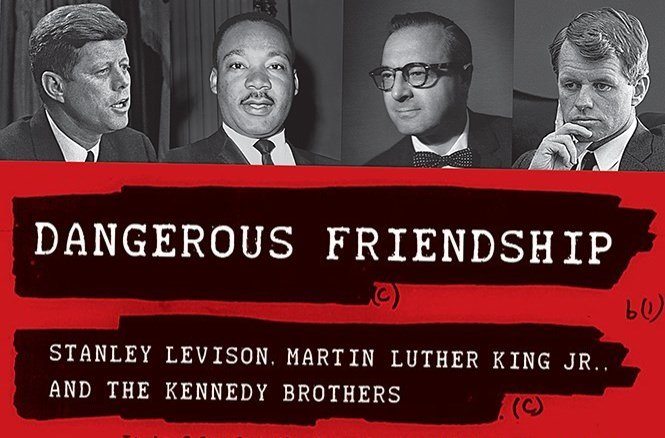
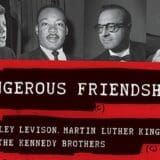
Most students of the 1960s may know about the FBI’s obsessive surveillance of Martin Luther King Jr. and how the bureau’s shadowing and bugging of the Southern Christian Leadership Conference’s president would lead federal agents to infiltrate the civil rights and peace movements. Now, a new book by Ben Kamin throws a spotlight on the man whose close friendship and collaboration with King provoked J. Edgar Hoover’s wrath and paranoia. Dangerous Friendship analyzes the relationship between King and Stanley Levison, a lawyer and wealthy businessman with a radical past. The book tells how Levison, known as King’s ghostwriter and closest white friend, advised King on strategy and raised righteous amounts of money for his cause; the story also shows how their friendship prompted the Kennedy White House to force King to shun Levison for more than a year.
Kamin, a nationally known rabbi, also explores how Levison’s personal solidarity with African American struggles reflected a traditional Jewish embrace of equality and social activism.
» Read more about: Tonight: Ben Kamin on MLK’s “Dangerous Friendship” »


In a scene right out of Orange Is the New Black, 1,000 inmates at the Ohio Reformatory for Women in Marysville, Ohio dumped their food in protest last week after maggots were found in the kitchen and dining areas. The prison’s food service program had been outsourced to the massive Aramark corporation.
Maggots have also been discovered in seven other prisons around the state – and Aramark runs the food service programs in all of them. Last month, maggots were discovered in two Michigan prisons where Aramark also runs the food service programs. The Philadelphia, PA-based corporation hasn’t taken responsibility, and officials in both states are sticking by the vendor, responding with small fines instead of canceling the contracts. Ohio fined Aramark $270,000 and Michigan Governor Rick Snyder fined the company a mere $200,000.
» Read more about: Outsourcing: Maggots on Aramark’s Prison Menu »
https://vimeo.com/101205760
Alone and Afraid from Capital & Main on Vimeo.
The clock is ticking for six refugee children from El Salvador and Guatemala who are plaintiffs in a class action lawsuit that seeks to compel the Obama administration to ensure access to legal representation for tens of thousands of unaccompanied minors facing deportation proceedings.
The plaintiffs are among the more than 50,000 Central American children who have illegally crossed the border into the Southwestern United States in recent months, fleeing threats of violence by transnational street gangs that arguably exert more effective control over the daily lives of residents in large swathes of El Salvador, Guatemala and Honduras than those countries’ national governments.
Over a period extending from this month to early next year, the six plaintiffs are scheduled to appear for their own deportation hearings.
» Read more about: Refugee Children Seek Representation in Courts »


I have a friend who is intelligent, thoughtful and holds a responsible position in a major firm. From time to time we exchange ideas about the condition of American society, particularly how the economy shapes our democracy these days. We often agree about the dimensions of the problem, but disagree about what should be done about it. When it comes to the inheritance tax, we stand at opposite poles.
He thinks that what a person has accumulated in their lives is theirs to do with as they please, period. If they want to hide it offshore in the Virgin Islands, fine. If they want to give it all away, fine. And if they want to just pass it along to their children, no problem. As far as he is concerned the 400 who own as much as half the American population can do whatever they want – it’s their money.
I’ve always thought the opposite.


Isabel Mejia was 17 years old when she arrived in the United States from El Salvador, having fled her home country for reasons even the most hardened immigration opponent might have trouble dismissing. Some local gang members had decided to conscript her as the “gang’s girlfriend” — to force her into a life of sexual slavery. At home, the situation was no better: She had been a victim of domestic sexual violence. Faced with rape, death or flight, she chose to flee.
Today, Isabel (not her real name), now 18, lives in a small apartment in Southern California with her aunt. Her respite is only temporary. After crossing over the Mexican border into Texas, she had been captured by Border Patrol agents and held in a Houston detention facility before being released into her aunt’s care. Some time in the next few months, she will go before an immigration judge and, with the assistance of a pro bono attorney,


I wasn’t sure what to expect when arriving in Detroit, Michigan Wednesday. The city is heavy with symbolism in the American imagination – everything from Motor City and Motown to Broken Dreams and Bankruptcy. A recent article called Detroit “a mixed picture of hope and desolation.” Which side would reveal itself to me?
I craned my neck as the taxi cab sped along a highway. At first, I saw nothing special: clouds low and gray in the sky, SUVs on the road, overpasses and underpasses, and the occasional warehouse or big-box store.
And then I saw them: large, four- or five-bedroom, brick or wood houses alongside the highway. Every house was boarded up, caving in, spray-painted, overgrown with vines, or blackened with fire scars. The cab driver spoke angrily. “See those homes? It’s not safe there — looting and shooting. Do you see those homes?”
I did see them.
» Read more about: Coming Home to Detroit for Netroots Nation »


After a long hiatus from the spotlight, the immigration debate has flared up once more. Following an incendiary incident in which anti-immigration protesters in Murrieta, California turned away buses of immigrants heading into a detention center, the issue is now receiving a significant amount of attention.
The protesters were responding to a recent influx of immigrants across the U.S.-Mexico border, specifically near Texas. The majority of these immigrants are powerless women and children who have been displaced due to dire circumstances in Honduras and Guatemala. Border patrols have been rounding up these refugees and transporting them to processing centers where U.S. Immigration and Customs Enforcement (ICE) officials determine their legal statuses. Because most of the facilities in Texas are at maximum capacity, these immigrants are being transported to other processing centers. This most recent surge of migration has become such a major humanitarian issue that President Obama has asked for $3.7 billion dollars to help solve the problem
At first glance the Murrieta episode seemed like a major setback for immigrant-rights supporters,
» Read more about: Immigration Reform: Murrieta and Its Discontents »
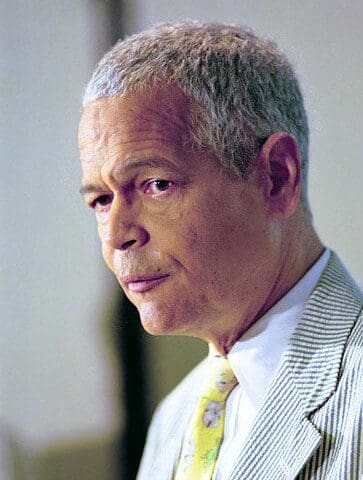
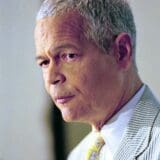
Last month Julian Bond, the pioneering civil rights activist and former Georgia state legislator, addressed an audience gathered in Jackson, Mississippi, to celebrate and analyze the Mississippi Freedom Summer of 1964. Bond’s speech appears for the first time here, with his permission. [divider]
In 1961, when Martin Luther King Jr. addressed the Fourth Constitutional Convention of the AFL-CIO, he spoke of the “unity of purpose” between the labor movement and the movement for civil rights. He said:
[tabs type=[tab_title][tab]“Our needs are identical with labor’s needs: decent wages, fair working conditions, livable housing, old age security, health and welfare measures, conditions in which families can grow, have education for their children and respect in the community. That is why Negroes support labor’s demands and fight laws which curb labor. That is why the labor-hater and labor-baiter is virtually always a twin-headed creature spewing anti-Negro epithets from one mouth and anti-labor propaganda from the other mouth.
» Read more about: Exclusive: Julian Bond on Labor and Civil Rights »


If you are even a semi-serious lover of film, then you probably have seen at least a few of Marlon Brando’s indelible performances in films such as A Streetcar Named Desire, The Godfather and Apocalypse Now, to name only a few. You probably also are familiar with Brando’s legendary appetites for women and food, the tragic arc of his family life and perhaps his controversial political stands.
What you likely don’t know – few do — is that the man widely regarded to be the greatest American actor of the 20th century had a brilliant, restless mind to go with his innate talent and stunning looks. No, Brando was not merely a hunk with a mysterious intuitive genius — he was a student of history and the human condition who read voraciously and wrote some of the most famous lines from his epic performances.


“When you’re in Mississippi the rest of America doesn’t seem real. And when you’re in the rest of America, Mississippi doesn’t seem real. ”
— Bob Moses, Mississippi Freedom Summer Director
The Mississippi Freedom Summer project of 1964 was born of necessity. The ranks of civil rights workers in the state were being devastated and the nation needed to pay attention. The proposal to bring hundreds of college students into Mississippi for the summer to work as voter registration and Freedom School volunteers was controversial. Opponents worried that the mostly white students didn’t know the state, might distract from building grassroots leadership and could provoke even more retaliation from Mississippi segregationists. But according to civil rights veterans who convened the 50th Anniversary gathering of Mississippi Freedom Summer in Jackson this past June, it was the local leaders, like former sharecropper Fannie Lou Hamer, who strongly supported the idea.